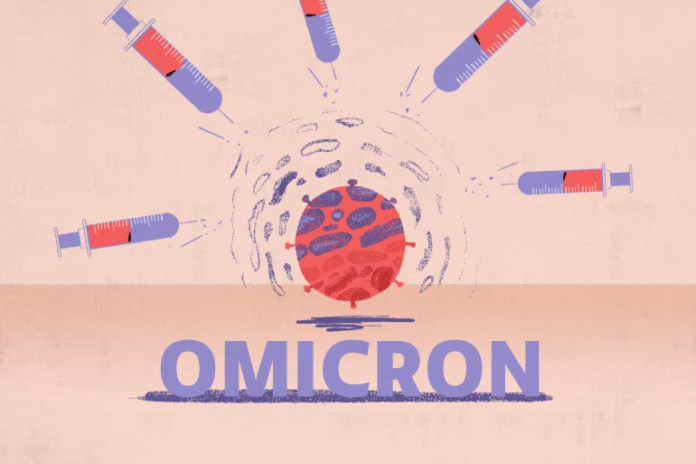University of Otago epidemiologist Dr Amanda Kvalsvig has done Aotearoa New Zealand a favour by advocating in the mainstream media (11 January) that all schools, including early childhood facilities, should delay reopening after the summer break until “basic protections” against the omicron variant of Covid-19 were in place: .
Her argument was that more time was needed to vaccinate 5-11 year olds (nearly half a million), give booster shots to older students and education staff, ensure carbon dioxide monitors and air filters were installed in classrooms, and for high-grade N95 masks and rapid antigen testing to be available in schools.

Dr Amanda Kvalsvig has encouraged a healthy debate
Based on information from overseas she feared omicron triggering “an avalanche of child cases, at higher rates than previously seen in this pandemic”. High infection rates were hard to manage in schools and hospitals and there were rising concerns about lasting effects in children, including ‘long Covid’ and autoimmune problems such as diabetes.
Healthy debate
Kvalsvig’s comments prompted healthy debate. Some paediatricians disagreed with delaying school reopening given there was no community outbreak of omicron and relatively low cases of the delta variant. They were concerned that prolonged school closures can be harmful for children’s wellbeing and development.
Professor Peter McIntyre, a paediatrician specialising in infectious disease at Otago University, described delaying reopening schools as an “overreaction” because of the harm to children would be much higher than any benefit in disease prevention.

Professor Peter McIntyre warns of overreation
So who is right? The epidemiologist or paediatricians? The answer is both. The two approaches are not necessarily in conflict. It completely depends on how things unfold with omicron.
Describing omicron as a dilemma for schools, Cherie Taylor-Patel as President of the Principals’ Federation summed it up well. While schools want to reopen smoothy without delays after the disruption of last year, they were also concerned about virus spread. She was hoping for at least two-thirds of 5-11-year olds to be vaccinated before going back to school.
In Taylor-Patel’s own words: “What happens in the next two weeks is critical.” In other words, government has to make and action the right decisions by the end of January. Australia provides realistic context for decision-making.
Across the Tasman
On 7 January Australia had 91 Covid-19 deaths per million people. By 18 January this rate had increased dramatically to 108. Over the preceding seven days there were 285 deaths representing a mortality rate per million of 11.
In other words over this seven day period there were more deaths per million than the total rate in New Zealand since the pandemic arrived in early 2020 (9 per million).
This is devastating especially as it is now across most Australian states including those who had been successful in their response to the delta variant by using the elimination of community transmission strategy.
While our Labour government erred in lowering Auckland’s alert levels too early and abandoning elimination there, it is clear that elimination won’t stop omicron once it gets into the community.
This will instead require a mitigation strategy designed to first control and then suppress omicron, recognising the need to significantly increase vaccination rates (even though high by international standards) and implement boosters to the already vaccinated.
A must read blog
Fortunately the University of Otago’s Public Health Expert (17 January) have published timely advice which the Government would be foolish to disregard: .
The blog is a collaborative piece by five experienced experts, one of whom is Dr Kvalswig. The others are Professor Michael Baker, Dr Jennifer Summers, Dr Matire Harwood and Professor Nick Wilson.
It begins by noting that the delta variant is now under control as evidenced by declining daily infection cases and hospitalisations. But it then describes the contrasting omicron outbreak threat by identifying the dramatic increase in the seven day average of infections detected at the border since late December.

In summary, the blog advises that based on omicron’s around two months experience, compared with the delta variant, it is much more transmissible and less severe (especially for the vaccinated) but is not a mild infection.
Therefore the authors assess that “…a poorly controlled Omicron outbreak in NZ risks overwhelming the health care system, increasing inequities, and disrupting essential services as is being seen overseas.” What Australia is presently experiencing provides the best example of what Aotearoa should expect.
Urgent actions
Consequently they recommend urgent actions in order to minimise omicron harm beginning with delaying its entry to the country. This should be much more than the Government has recently announced including immediately further reducing infected travellers arriving, tightening pre-departure testing requirements, and further delaying border reopening beyond February.
Other recommended measures (expanded in the blog) include:
- continuing to suppress and ideally eliminate the delta outbreak;
- continuing to boost immunity (including 5-11 year olds) to both omicron and delta;
- shifting from minimising the number of infections to a ‘flatten the curve’ goal;
- introducing an upgraded alert system to include briefer more localised periods of controls (recognising that the traffic lights system is largely orientated towards achieving an indoor vaccine mandate);
- a more developed mask strategy to support the effective use of high-quality masks in all settings where they will make a meaningful difference;
- supporting schools, workplaces and essential services to prepare for omicron (such as adequate sick leave and ventilation);
- uprading Covid-19 testing capacity; and
- measures to protect the healthcare system and improve support for home care.
Looking ahead
The blog then identifies longer-term measures to reduce the risk from new variants which may be more rather than less virulent. Some involve New Zealand building its capacity for high-quality risk assessment and management so that it can adapt its response strategy to changes in the pandemic. Some require improved global health leadership and equity to delivery vaccines and other interventions.
This advice from Drs Baker, Kvalsvig, Summers, Harwood and Wilso is based on experience and expertise. Further, unlike the advice of less experienced and less expert business consultants the Government is following in restructuring our health system, it is free and absent of self-interest. It deserves to be followed.
Ian Powell was Executive Director of the Association of Salaried Medical Specialists, the professional union representing senior doctors and dentists in New Zealand, for over 30 years, until December 2019. He is now a health systems, labour market, and political commentator living in the small river estuary community of Otaihanga (the place by the tide). First published at Otaihanga Second Opinion






Thanks Ian Powell for this information. I trust the expert advice and hope Govt continues to do so.
I am heartily sick of the anti vax misinformation crusade on this blog. They are swamping it with BS.
Keep up the good work.
Ian, I am sure the government would love it if the only consideration was to stop transmision of the virus. It is undoubtedly the role of medical experts to advise how to achieve this; however they are unencumbered by the other needs to keep the country functioning. So far I believe the government have achieved significant success in balancing all the conflicting pressures being imposed on us by the pandemic. Omicron has certainly changed the path forward, I can only hope the government gives suffecient heed to the advice of the experts you quote.
The sensible health professional you quote at the start makes good points and states effective counter measures against the disease. Anyone who has little kids going to playschool knows how they bring disease home, how it spreads throughout the childcare centre. It’s a great melting pot and a backdoor for the disease which will sneak in to all families and probably to others beyond.
The Otago paediatrician saying that delay is not necessary; I would expect to see some suggestions put forward as to how the rate of infections can be kept down. It isn’t something to give a carte blanche to.
If Omicron breaks into the Auckland community at the start of February, cases will hit a peak of 1500 to 1800 a day within four weeks, before falling to 150 to 330 per day from May, according to district health board modelling.
https://www.rnz.co.nz/news/ldr/459957/auckland-district-health-boards-brace-for-1800-omicron-cases-a-day
How about NSW which has now gone down to over 25,000 new daily cases on January 20 of Covid from higher just before.
NSW records 30,825 new COVID-19 cases and 25 further deaths
https://www.9news.com.au/national/coronavirus-nsw-updates-new-case-numbers-school-plan-to-be-unveiled-rapid-antigen-tests-arrive/433d5ffb-dd14-4225-ba7a-ad5b0709cd61
At the rate of 20,000 cases per day, in 14 months time everybody in NSW will have had a case of the covid.
Perhaps it is time for the experts to start talking about super immunity that is achieved from a combination of receiving the vaccine and contracting the actual covid infection.
Maybe the article author can write a piece about that after consulting the academia experts?
Worth a read
https://www.wsj.com/articles/herd-immunity-is-over-superimmunity-covid-omicron-immune-system-virus-variants-antibody-antibodies-11642448736
“I think this speaks to an eventual end game,” said co-author Marcel Curlin. “It doesn’t mean we’re at the end of the pandemic, but it points to where we’re likely to land: Once you’re vaccinated and then exposed to the virus, you’re probably going to be reasonably well-protected from future variants.” Dr. Curlin added: “Our study implies that the long-term outcome is going to be a tapering off of the severity of the worldwide epidemic.”
Maybe it is best, at 90+% vaccination rate, to let the new variant in and spread it widely. At the rate it has spread in NSW, this time next year we will all be super immune. Well the 90+% that are vaccinated.
More on super immunity
https://news.ohsu.edu/2021/12/16/breakthrough-infections-generate-super-immunity-to-covid-19-study-suggests
Let me tell the experts and academics why the next variant of covid is going to strike hard and deep (and disappear just as quickly) here in South Auckland and in all the lower socioeconomic areas throughout New Zealand. The experts and academics (and politicians) don’t have a clue or even an understanding what living, earning, housing, and employment conditions are like in these regions.
1- People per household. There will be no where for an infected parson to self isolate. Population density per housing unit is much higher than to leafy suburbs and beach fronts occupied by the experts and academics.
2- Loss of income. People don’t scan in anywhere for if they become “on scene” in a place of interest they will need to self isolate. No going to work. Sure the state pays $600 per week to the employer to cover any absence but that is hardly enough to keep a roof over ones head and food on the table. Who can risk the loss of income? Better to go to work sick than going onto the state’s meager welfare.
So pontificate on about a reaction you may consider from the ivory towers of the leafy suburb or beach front, the truth is nothing that has been noted in the article does anything for the people in the lower socioeconomic areas. Zip, zero, nada.
Surprisingly waste water treatment testing for covid is not mentioned. Why not? Surely to measure to the extend and fast reduction of covid in the populace, waste water testing is a must?
Or are the experts, academics and politicians weary of the waste water testing which shows covid is already on the decline from the delta variant.
Note though the gaps in reporting the testing? Why the reluctance to publish the results? Auckland east, west and south at week ending January 1st, covid detected. After that no results. But results from other regions!
https://www.esr.cri.nz/our-expertise/covid-19-response/wastewater-testing-results/
Why is it that the largest and densest population centres are being ignored? Not just for waste water treatment results, but from a coping from a socioeconomic perspective.
Ok for the salaried staff, try working on wages and having to self isolate.
I suspect these “medical experts” avoided the more tough maths modules during their education because a lot of what they say implies they don’t understand the implications of the data. Some examples:
All those fatalities represent those who died WITH Covid 19 but not necessarily OF it. Many western nations including the UK and US are now walking back on their data by assigning many of these deaths to other causes. The actual fatality rate is far lower than they previously claimed. The UK now calls these “Deaths involving coronavirus”.
The Director of the US CDC came out with two very interesting statistics recently: Firstly she said CV19 fatalities had an average of four co-morbidities and fully half of those who were hospitalized were admitted for reasons other than CV19. So CV19 is a death sentence those who are already at deaths door.
The average age of a CV19 fatality is greater than the average lifespan in the UK, Australia and USA.
Children are almost entirely unaffected by the Omicon variant. Most don’t even get symptoms. I cannot fathom why there is a rush to vaccinate them, other than making more money for Pfizer. Sure, there are thousands of “cases” in children but that’s just media spin for a positive PCR test. Basically nobody under 12 dies of CV19 and the vast majority won’t even know they’ve had it. Once infected they have a more robust immunity to the virus than any of the vaccines can provide.
References:
https://www.health.gov.au/health-alerts/covid-19/case-numbers-and-statistics#cases-and-deaths-by-age-and-sex
https://www.bbc.com/news/health-51674743
https://www.reuters.com/article/factcheck-walensky-study-idUSL1N2TS0S2
What we miss in the respond is the practical advice: what are the most effective steps of prevention, what vitamines, what supplements in what doses are recommended, what are the common symptoms of Omicron, if and how we should treat them at home, where we should turn for help, to our GP? Where can we get the RAT tests and high quality masks? Should we care about getting tested and wait in long queues or prefer to stay home, isolate and take some remedies? What are the early treatment options, who is going to presribe them?
The other problem is that with Omicron variant the vaccine mandates and passports have no raison d’etre at all and should
be abolished as soon as possible.
https://youtu.be/bnMMYJKZvnU
ACD, you obviously have no intention of even acknowledging the often repeated simple advice from legitimate sources as to required actions if infected; against that mindset it would be unwise of me to even try and dispute your invalid claims about vaccines and passports. If you and your ilk would get vaccinated and follow the rules the sooner we could all get a little more of the freedom you obviously desire.
ACD is right in that we need to learn to embrace covid.
Interestingly the governments stance is changing to one of management.
https://www.stuff.co.nz/national/explained/127562368/covid19-chris-hipkins-says-significant-border-changes-are-possible-in-first-half-of-this-year
“We can’t do what we’ve done for the last few years and say, let’s pursue a ‘keep that out strategy’ indefinitely. We just know that that’s not going to be sustainable.”
So lets have a discussion about covid management and at least acknowledge that what ACD is asking is worthy of consideration.
Unless you are of a closed mindset and blindly follow your ilk as a good soviet citizen.
Gerrit, it seems to me that people are looking for magic solutions to this problem that simply don’t exist. The best we can all do is follow the simple guidelines (masks, distancing, hand washing, staying home if unwell) that have been well published. Mandates are to protect those who by the nature of their work will be at greater risk or put vulnerable people at risk – seems sensible to me. Ironically from here on its all about limiting spread to a rate that allows the health system to continue to function. If you think that makes me a ‘good soviet citizen’ then so be it – because its by following the basic rules that will get us through this.
PK, I have read the advice from legitimate sources but they do not say about RAT tests, where to get them (only for travellers till 31st January), do not say about high quality masks and where to get them, not a word about prevention before you get infected from the legitimate sources. The advice you can get there does not reflect the experiences of countries that were or are affected by Omicron variant, e.g. that the number of infected persons makes contact tracing practically impossible as well as PCR testing for all cases, which opens the question where we can get enough RAT tests, or should we opt for long queues to get tested when we may not feel well.
As for the vaccine mandates and passports: we all know that the current vaccines were developed for the “original” variant of the virus, that they work less for Delta variant and do not give you any protection against infection and transmission with Omicron variant due to its multiple mutations. So a vaccinated person can catch the virus and spread the virus the same way as an unvaccinated one. So where is the raison d’etre for mandates and passports? Have a look at the video:
https://youtu.be/bnMMYJKZvnU
The vaccines give you protection against severe disease (not perfect as we all know, there are vaccinated persons in hospitals and there are vaccinated persons dying of Covid).
https://youtu.be/D0gWB9M8538
https://youtu.be/ZGyFOZivjs4
I am double vaccinated and have persuaded other members of family to get vaccinated, but I am against mandates and pasports.
ACD, my experience so far has been if you are a close contact or been in a location of interest Health Line will take care of most of what you are concerned about. If they were to advertise where RAT’s are available I bet there would be none there by the time we arrived to get one! Correct me if I’m wrong but my understanding is RAT’s are really only useful for routine monitoring, if you feel unwell PCR test is required.
Quality masks are available on-line, I had some delivered within days of ordering from NZ manufacturer.
To me mandates and passports provide a medium level of control that assist in keeping numbers under control – I’m sure we are all aware by now that from here on it is a ‘numbers game’ aimed at trying to keep the health system functioning. In my view any attempt to prevent a repeat of the oversea’s experiences is to be applauded, not ridiculed or worse openly flouted.
The situation has changed but the absurd mandates and passports stay. Don’t you mind that these policies incite sneaking? I try my best to obey laws and rules and also those that I do not agree with. But to denounce is something totally different.
ACD, Should we abandon all laws and rules that people sneak around? There wouldn’t be any laws left. I totally disagree with your claim that the mandates and passports are absurd; they provide a level of infection spread control – those that sneak around them are thumbing their noses at us all, especially at those that need, or will need in the months ahead, medical care. Keep up your compliance; hopefully enough people will ‘just comply’ for the good of us all.
Taking into account the high rate of vaccinated people in NZ, the high transmissibility of Omicron variant and its multiple mutations from the original one that makes it very immune evasive, it is sure that the vast majority of infected and infectious people will be vacinated, so I am afraid but there will be very small or none level of infection spread control by means of mandates and passports. Professor Cyrille Cohen, head of Immunology at Bar Ilan University and a member of the advisory committee for vaccines for the Israeli Government admitted that actually mandates and passports are in this situation futile (as in the link above).
And as I understand it, the execution of laws and rules is not primarily based on citizens sneaking who does not comply with them but on the process of accusation (in the case of harm), prosecutions, conviction, sentence, punishment.
Comments are closed.